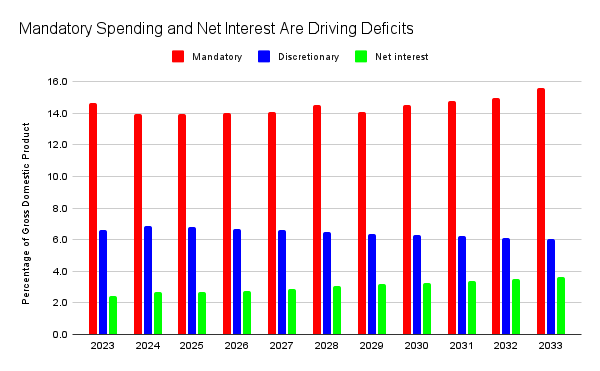Conservatives Are Ignoring Drivers of Deficits
The House Is on Fire, and Few on the Right Seem to Care
Since the State of the Union address on February 7, Republicans been falling over themselves to push back on notion that they support cuts to entitlement programs like Medicare and Social Security. The ex-president has also been outspoken against cuts to these programs. He’s also fired shots at Sen. Rick Scott (R-FL), who has been the subject of Biden and Democrats’ criticism, and his rivals for the Republican presidential nomination, former U.N. Ambassador Nikki Haley and Gov. Ron DeSantis (R-FL).
The ex-president said much the same during his 2016 presidential campaign. Although White House staffers told conservative groups behind-the-scenes during the 2017 debt limit debate that entitlement reform was “a fifth-year priority,” few (if any) of us in the room really believed that. Today, conservatives seem to believe that they can solve our budget issues by simply cutting “woke spending.” One proposal floated by former Office of Management and Budget Director Russ Vought focuses on a combination of deep domestic spending cuts, including cuts to Medicaid and food stamps, and slashing “woke spending.”
Bless his heart.
I’ve wrote recently about spending issues and explained that cutting discretionary spending isn’t going to be nearly enough. That said, I was using figures from the Congressional Budget Office (CBO) that are now obsolete. The CBO rolled out new numbers last week, and they show that getting a handle on the budget without changes to entitlement programs isn’t only unrealistic, but it’s also an absolutely absurd notion.
Nondefense discretionary spending is projected to come in at $11.5 trillion over the next ten years, FY 2024 through FY 2033. It represents 14.4 percent of all federal spending over this timeframe. Congress could eliminate all nondefense discretionary spending in FY 2024 through FY 2033 and still run decent sized budget deficits by FY 2033. The average budget deficit between FY 2001 and FY 2019 was 3.9 percent of gross domestic product. (I didn’t include FY 2020 and FY 2021 for obvious reasons.) With no cuts to nondefense discretionary spending, the budget deficit in FY 2033 would be 7.3 percent. With a 50 percent cut, it would be 5.6 percent. With a 100 percent cut, it would be 4 percent.
On the other hand, mandatory spending, which includes entitlement programs like Medicare and Social Security, is 61.7 percent of all federal spending in FY 2023 while interest on the debt is 10.3 percent. Although mandatory spending will stay at 61.7 percent of all federal spending in FY 2033, it will continue to grow as a percentage of GDP. Interest on the debt will also rise as a share of GDP while discretionary spending will decline.
When it comes to mandatory spending programs, the Social Security Old-Age and Survivors Insurance (OASI) Trust Fund and the Medicare Hospital Insurance Trust Fund have dedicated revenue streams, but the number of workers contributing to through payroll taxes has been on the decline for decades. If this were an insurance company in a state, regulators would’ve already taken action because of the lack of proven reserves to pay out claims.
Once you look at the unfunded liabilities that the federal government (read: taxpayers) has, it comes out to $104.2 trillion. Thing is, folks, it’s only going to continue to grow. Unfortunately, some of these issues are imminent if Congress continues to do what it has been doing, which is basically ignoring it. The Hospital Insurance Trust Fund can cover only 90 percent of scheduled benefits after depletion in FY 2028. The Old-Age and Survivors Trust Fund can cover only 77 percent of scheduled benefits after depletion in 2034. This means beneficiaries will see cuts because these two trust funds won’t have the money to pay scheduled benefits.
Now, Congress could transfer money from general revenues to cover the shortfalls, but that doesn’t really address the problems that exist. Reforming the programs aren’t a politically attractive idea, especially when you consider that older voters are basically the only reason Republicans can win elections, but doing nothing here isn't an option.
Reforming the programs to raise the retirement age, means test benefits, and even giving more freedom to future beneficiaries while protecting current ones are options that conservatives should support. They used to, but I’ll not once again that the movement has changed, and it has changed for the worse.





